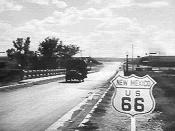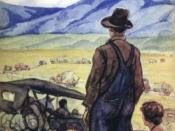The "Dirty Thirties" brought much struggle to the people of North America. With the stock market crash of 1929 and the droughts and dust storms that dominated the next ten years, life in the Great Plains region of the United States was miserable. Many families packed up as many belongings as they could manage and began their journey to find work. Some families went towards California and the West and others went towards the East. John Steinbeck, who was born in the Salinas Valley of California, witnessed first hand much of this migration to the West and he wrote many books pertaining to his home state. Of Mice and Men and The Grapes of Wrath are two such examples, examining two very different migrant families during the 1930s. Steinbeck's books have often been criticized for being untrue to the history they explore (Timmerman 5). Nevertheless, the characters in these two books have certain elements in common with migrant workers of the Depression.
The main struggles for migrant workers during the 1930s were work and survival, looking out for one another, and dreams.
Surviving the Great Depression was a major concern for people all over North America, and the people of the Great Plains had tough weather conditions to deal with in addition to the failing economy. The "Dust Bowl", a series of dust storms and destructive winds, was very destructive in this region of the United States. Oklahoma, the home of the Joad family in The Grapes of Wrath, was one of the areas hit hardest by the dust storms. The Joad family has to leave the state in search of a better life in order to find work and to survive. They try to get by on as little as possible, eating cornmeal for quite some time...


